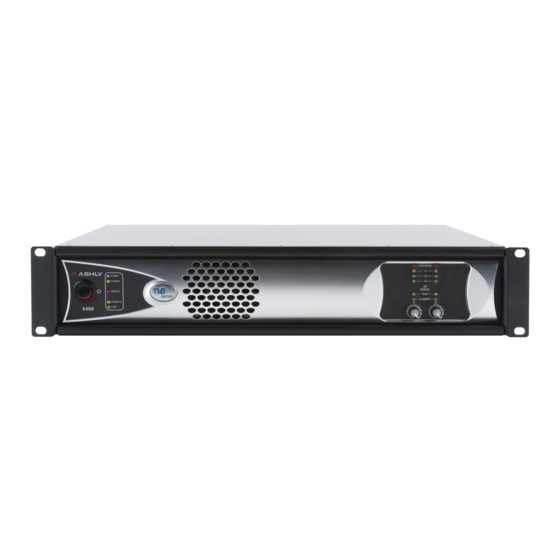Ashly ne800.10 Manuel d'utilisation - Page 9
Parcourez en ligne ou téléchargez le pdf Manuel d'utilisation pour {nom_de_la_catégorie} Ashly ne800.10. Ashly ne800.10 12 pages. Network enabled two channel power amplifiers
Également pour Ashly ne800.10 : Manuel d'utilisation (12 pages), Manuel d'utilisation (16 pages)

3) Polarity button - This inverts the phase
of the input channel.
4) Offset link group - Up to 16 groups
are available for the purpose of linking similar
function parameters across multiple channels. In
addition to the control surface secondary level
control (not the main fader), most DSP functions
have a link group check box in their work window
to assign a specific parameter to one of the 16 link
groups. Link groups can be renamed by clicking
on any group name and entering the new name
then pressing <enter> on the keyboard.
5) Attenuators - These two dials indicate the
physical position of hardware controls on either
the amp front panel or on a remote level control.
Note that these will display the current position
of attenuators even when disabled in software.
6) Total Attenuation - This indicates the
total amount of attenuation being applied to the
channel. This is the sum of the following attenu-
ators: main fader, offset link group attenuation,
front panel and remote attenuators.
7) Meters - Input and Output meters display
the real time activity per channel, in dB below
rated output. Also, the amplifier's operating
temperature and output current are shown. Output
current shows that the amplifier channel is actu-
ally delivering output to a connected speaker load.
The DSP Control Tab
Extensive online help information is available for all DSP blocks. Look in the Protea
and Index/Contents/Protea NE Products/NE Amplifiers/DSP Control for details of all DSP functions. The key features include:
1) Input Channel Number - Right click on this to bring up Clear, Copy, Link, and Sub Preset functions for that input channel.
2) Input Channel Name - The user can name each input channel.
3) Input Mute Button - Mutes the input.
4) Pluggable Input DSP Tools - Six boxes are available for custom configuration of pluggable DSP processing blocks.
Available DSP blocks include Dynamics controls, Gain and Remote Gain functions, Graphic and Parametric EQ, Crossover
functions, Delay, Metering, and a Signal Generator.
5) Input/Output Matrix Router - Any input can be routed to any or all outputs. Click and drag from the input to output to
assign routing. To delete a route, right click on the routing line and delete.
6) Output Mixer - For a given amplifier output channel, all inputs that have been routed in the matrix router are mixed
together here.
Operating Manual - NE Two Channel Power Amplifiers
(Image on next page)
Protea
ne
Two-Channel Amplifier Control Surface
ne
Software Help Menu/Contents
9
